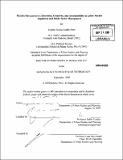| dc.contributor.advisor | Judith Tendler. | en_US |
| dc.contributor.author | Pires, Roberto Rocha Coelho | en_US |
| dc.contributor.other | Massachusetts Institute of Technology. Dept. of Urban Studies and Planning. | en_US |
| dc.date.accessioned | 2010-05-25T20:52:13Z | |
| dc.date.available | 2010-05-25T20:52:13Z | |
| dc.date.copyright | 2009 | en_US |
| dc.date.issued | 2009 | en_US |
| dc.identifier.uri | http://hdl.handle.net/1721.1/55135 | |
| dc.description | Thesis (Ph. D.)--Massachusetts Institute of Technology, Dept. of Urban Studies and Planning, 2009. | en_US |
| dc.description | Cataloged from PDF version of thesis. | en_US |
| dc.description | Includes bibliographical references (p. 173-186). | en_US |
| dc.description.abstract | This dissertation is about state bureaucracies and the conditions under which they learn, innovate, and play a positive role in social and economic development. It takes issue with the extant literature on the topic, which has either looked at such organizations from the outside and prescribed the "essential" prerequisites for success (e.g. corporate coherence, cohesiveness, performance management, etc.) or examined such organizations from the inside and emphasized the obstacles for change and improvement (e.g. resistance to change and impediments for accountability in "street-level bureaucracies"). In contrast to these approaches, this dissertation aimed at understanding how bureaucrats behave (what they do) when they actually promote development. Through what processes do bureaucrats manage to learn, change, innovate, and solve problems? Why in some cases they use their discretion to serve rather than, as previous literatures have asserted, to thwart the public interest? The research involved extensive data collection through on-site fieldwork on the Brazilian Labor Inspection Department, as well as detailed investigations of a sample of 27 cases of labor inspectors' intervention in different economic sectors and states. This sampling strategy generated a series of subnational and controlled comparative analyses at three distinct levels: a) variation in behaviors at the street-level; b) management practices and structures, their effects on work routines and inspection practices; and c) the role of narratives about work and horizontal relationships within the organization. | en_US |
| dc.description.abstract | (cont.) The findings suggest that many of the descriptions and arguments in the literature about how bureaucracies operate and the processes through which they supposedly trigger development are at best myopic. In contrast to prevalent models that neglected or characterized discretion and variability in bureaucratic behavior as impediments for development, I argue flexible bureaucracies explore discretion as a condition for organizational learning and improvement. By discussing previously understudied links between discretion, creativity, and accountability, this dissertation elaborates on the processes through which internal heterogeneity and the seemingly organizational inconsistency resulting from discretion (e.g. coexistence of different understandings about work, practices, and behaviors within the same organization) create opportunities for experimentation, continual reflection on practice, as well as alternative forms of accountability on bureaucratic behavior. | en_US |
| dc.description.statementofresponsibility | by Roberto Rocha Coelho Pires | en_US |
| dc.format.extent | 186, [1] p. | en_US |
| dc.language.iso | eng | en_US |
| dc.publisher | Massachusetts Institute of Technology | en_US |
| dc.rights | M.I.T. theses are protected by
copyright. They may be viewed from this source for any purpose, but
reproduction or distribution in any format is prohibited without written
permission. See provided URL for inquiries about permission. | en_US |
| dc.rights.uri | http://dspace.mit.edu/handle/1721.1/7582 | en_US |
| dc.subject | Urban Studies and Planning. | en_US |
| dc.title | Flexible bureaucracies : discretion, creativity, and accountability in labor market regulation and public sector management | en_US |
| dc.title.alternative | Discretion, creativity, and accountability in labor market regulation and public sector management | en_US |
| dc.type | Thesis | en_US |
| dc.description.degree | Ph.D. | en_US |
| dc.contributor.department | Massachusetts Institute of Technology. Department of Urban Studies and Planning | |
| dc.identifier.oclc | 599751687 | en_US |
